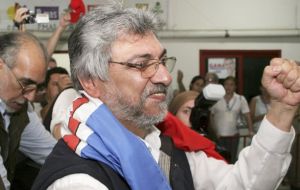MercoPress. South Atlantic News Agency
Paraguay cracks six decades of iron fist one party rule
 Former bishop Lugo takes office next August
Former bishop Lugo takes office next August Former Catholic bishop Fernando Lugo won a historic victory in Paraguay's Sunday presidential election, signaling the demise of more than six decades of one-party hegemonic rule in one of South America's poorest countries.
Ruling party candidate Blanca Ovelar, conceded defeat after a closely fought race to lead this poor, agrarian country. Thousands took to the streets to celebrate in the capital Asunción and other cities. Blanca Ovelar said Lugo had built an unassailable lead and that the outcome of Sunday's election is now "irreversible". Close to midnight, elections officials reported that with 70% of polling sites counted, Lugo has 40% of the vote, Ovelar 32% and a former Army Commander in chief Lino Oviedo 22%. President Nicanor Duarte on national television admitted his party's defeat and promised to collaborate from the opposition with all that which is positive for a democratic Paraguay. He underlined it would be the first time in the country's history that a change of government occurs without "a revolt, coup, uprising or any form of violence". Lugo's victory more than the promise of change, and an "end to corruption and poverty", marks a direct hit to the Colorado Party iron fist grip of virtually all aspects of life in landlocked, poor Paraguay, since 1947. An estimated 43% of the 6.5 million Paraguayans live in poverty and another two million have looked for better prospects mainly in Argentina, Brazil, US and Spain. Lugo, 56, dubbed the "bishop of the poor" is the latest in a series of leftist, or center-left, governments elected to power this decade in South America. (Chile, Brazil, Uruguay, Argentina, Venezuela, Ecuador, Peru, Bolivia) Distrustful of electoral officials and with 20% of votes counted, Lugo called a press conference where he virtually considered himself the winner and thanked all personnel at voting booths and international observers, who came in the hundreds, for their efforts in ensuring transparency. Lugo said the magic word of the campaign proved to be "change" and thanked the Paraguayan Authentic Radical party, long established, for having given him the necessary structure and support to enable the "spontaneous movement for change" to vertebrate into a victorious organization. "This is the Paraguay that I dream of, of many colors, many faces," he said in reference to his center-left coalition, Patriotic Alliance for Change. Lugo promised that with the help of the people Paraguay would no longer be known for corruption, poverty, contraband but rather for "honesty, hard work, modernity, as we once were and will be again". Voting was compulsory for Paraguay's 2.8 million registered voters. Eight months ago, Lugo welded leftist unions, Indians and poor farmers into a coalition with Paraguay's main opposition party to form the Patriotic Alliance for Change. He then launched a charismatic campaign in which he blamed Paraguay's deep-seated economic woes on decades of corruption by an elite which ruled at the expense of the poor in a country of subsistence farmers. Lugo is also the first former bishop to be elected president. He resigned as bishop in December 2006 to sidestep Paraguay's constitutional ban on clergy seeking office. Lugo says he was influenced by the liberation theology frowned upon by the Vatican. But he declares he is neither on the "left" nor the "right," but leads an independent, pluralistic coalition. Lugo has distanced himself from the region's more radical leaders, such as Venezuela's Hugo Chavez, despite efforts by his opponents to link them. "Chavez is a military man and I have a religious background" Lugo told reporters in Washington last year. "My candidacy has arisen at the request of the people; it was born in a different way than Hugo Chavez's."




Top Comments
Disclaimer & comment rulesCommenting for this story is now closed.
If you have a Facebook account, become a fan and comment on our Facebook Page!